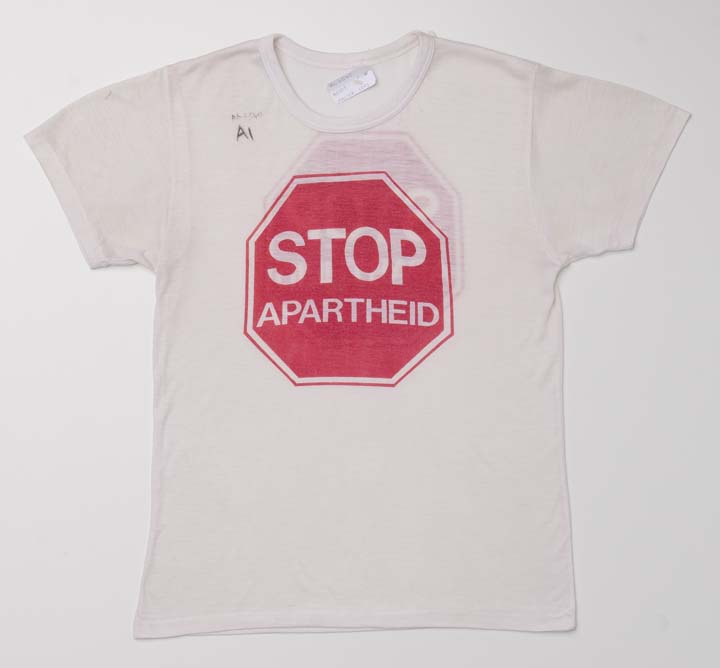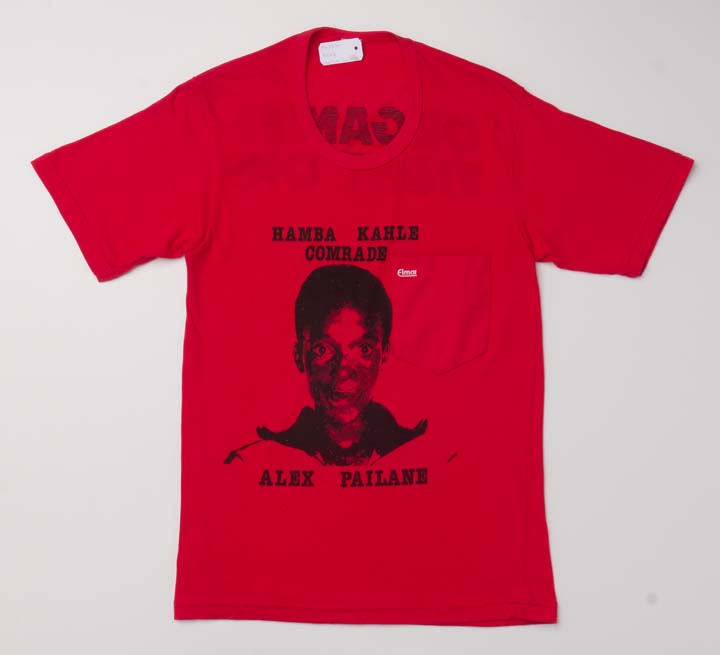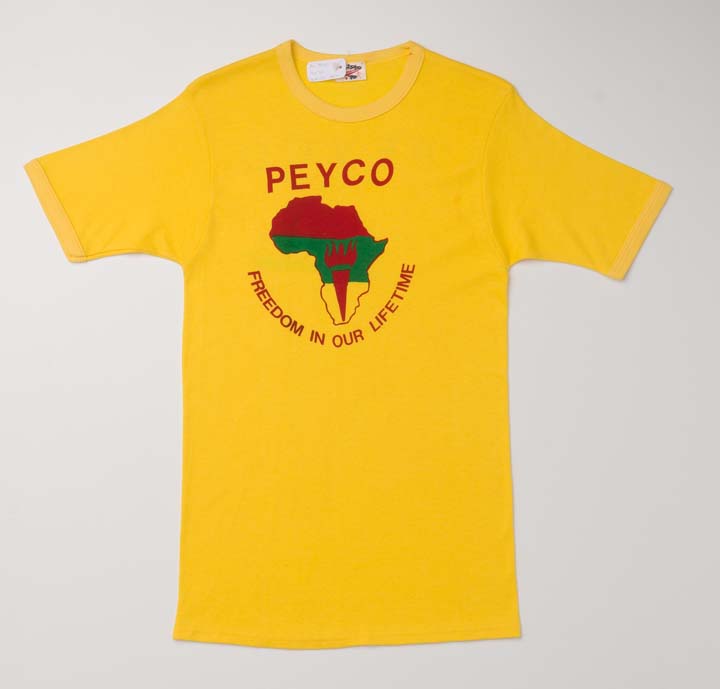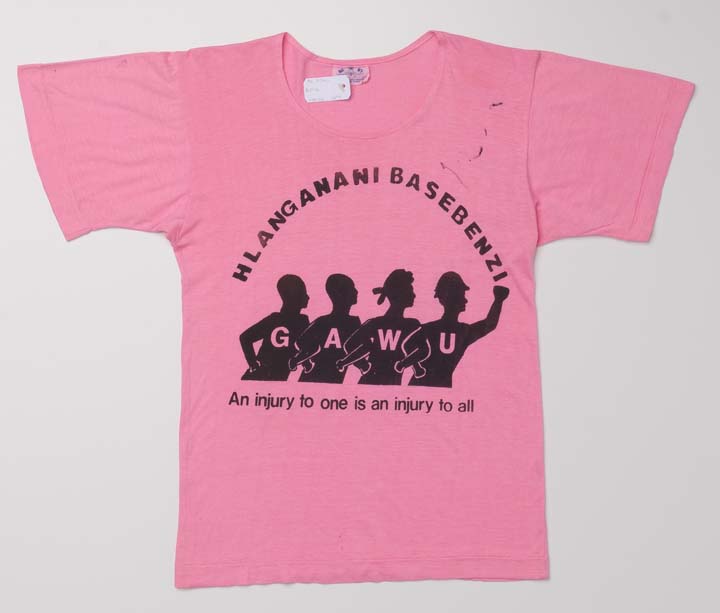 When looking back at the history of apartheid in South Africa t-shirts have been used by different political organisations. The oppressed majority used them to campaign and protest against the oppressors. They were used as a tool of mass resistance against the oppressive regime.
When looking back at the history of apartheid in South Africa t-shirts have been used by different political organisations. The oppressed majority used them to campaign and protest against the oppressors. They were used as a tool of mass resistance against the oppressive regime.
Many well known organisations like African National Congress (ANC), United Democratic Front (UDF), Pan African Congress (PAC), South African Communist Party (SACP), students and churches are a few of the well known organisations that also used t-shirts. These organisations approached artists at community workshops and requested t-shirts to be printed.
 Activism through t-shirts can be traced back to the late 70s to early 80s. Some activists trace them from Steve Biko’s funeral in which some believe that activists might have been wearing memorial t-shirts at his funeral. It is also believed that there were artists and individuals who would have been printing t-shirts for themselves and used them to protest against apartheid. Ben Dikobe Martins who was a poet, artist and political activist of the time, printed a Steve Biko memorial T-shirt in 1978. He was later arrested for producing a banned Steve Biko t-shirt.
Activism through t-shirts can be traced back to the late 70s to early 80s. Some activists trace them from Steve Biko’s funeral in which some believe that activists might have been wearing memorial t-shirts at his funeral. It is also believed that there were artists and individuals who would have been printing t-shirts for themselves and used them to protest against apartheid. Ben Dikobe Martins who was a poet, artist and political activist of the time, printed a Steve Biko memorial T-shirt in 1978. He was later arrested for producing a banned Steve Biko t-shirt.
 The Culture and Resistance Symposium organized by ANC in Botswana July 1982 promoted the idea of using culture as a weapon of struggle to resist the apartheid regime. Activists and artists inspired by this symposium came back and used all forms of art from music, drama, poetry, and craft as a form of resistance to the apartheid government. Political organisations like AZAPO among others continue to print t-shirts as to identify themselves for events such as memorials, protests and rallies.
The Culture and Resistance Symposium organized by ANC in Botswana July 1982 promoted the idea of using culture as a weapon of struggle to resist the apartheid regime. Activists and artists inspired by this symposium came back and used all forms of art from music, drama, poetry, and craft as a form of resistance to the apartheid government. Political organisations like AZAPO among others continue to print t-shirts as to identify themselves for events such as memorials, protests and rallies.
Individuals also expressed their political views, allegiances, solidarity and support of their political organisations by wearing the t-shirts in every rally or campaign in order to parade their political view and identity. Using t-shirts to commemorate certain events like May Day, they would mourn and honour fallen heroes and comrades and also mobilize the community against the ruling power.
The culture of t-shirts continued from approximately the early 1980s up to 1994 elections. In this post-apartheid era, the t-shirt has taken a new turn to address current politics and social economic issues that are prevalent in the South African society. The current political organisations for instance Economic Freedom Fighters (EFF) have used t-shirts in their rallies and campaigns. Others like Congress of South Africa Trade Union COSATU, ANC Youth League have continued using them in their meetings and also as form of organisation identity.
 This year as South Africans are gearing up for general elections in May, we have seen on a number of occasions of how the contesting parties are using the power of t-shirts in their campaigns in showcasing their political slogan in order to gain more support. In recent political campaigns the ANC, EFF, AGANG and other parties have strongly used their t-shirts accompanied by their political slogans in rallies, meetings and so on. These t-shirts have been used in a similar way just like how the oppressed majority used them against the apartheid regime.
This year as South Africans are gearing up for general elections in May, we have seen on a number of occasions of how the contesting parties are using the power of t-shirts in their campaigns in showcasing their political slogan in order to gain more support. In recent political campaigns the ANC, EFF, AGANG and other parties have strongly used their t-shirts accompanied by their political slogans in rallies, meetings and so on. These t-shirts have been used in a similar way just like how the oppressed majority used them against the apartheid regime.
SAHA is currently conducting a t-shirt project and part of this project is to do an audit of t-shirt collections in archives and museums around the country as well as internationally. The archives and museums that have recently been approached are the Unisa Archive, the ANC Archives at Fort Hare University, Iziko Museum, British anti-apartheid movement archive and many others. We have received positive feedback and valuable information we required and some are inviting us to come and do an archival audit in their collection.
Finally the aim of this project is to reflect upon the history of the apartheid era using t-shirts through oral history starting with SAHA's own t-shirt collection and collections found in other archives and museums as to develop a catalogue around struggle t-shirts.
If you have struggle t-shirts you would like to donate to SAHA, please contact the SAHA archives on archives@saha.org.za.
See inventory for the SAHA Ephemera collection (AL2540)
See inventory for the Culture and Resistance Symposium collection (AL2596)






 When looking back at the history of apartheid in South Africa t-shirts have been used by different political organisations. The oppressed majority used them to campaign and protest against the oppressors. They were used as a tool of mass resistance against the oppressive regime.
When looking back at the history of apartheid in South Africa t-shirts have been used by different political organisations. The oppressed majority used them to campaign and protest against the oppressors. They were used as a tool of mass resistance against the oppressive regime. Activism through t-shirts can be traced back to the late 70s to early 80s. Some activists trace them from Steve Biko’s funeral in which some believe that activists might have been wearing memorial t-shirts at his funeral. It is also believed that there were artists and individuals who would have been printing t-shirts for themselves and used them to protest against apartheid. Ben Dikobe Martins who was a poet, artist and political activist of the time, printed a Steve Biko memorial T-shirt in 1978. He was later arrested for producing a banned Steve Biko t-shirt.
Activism through t-shirts can be traced back to the late 70s to early 80s. Some activists trace them from Steve Biko’s funeral in which some believe that activists might have been wearing memorial t-shirts at his funeral. It is also believed that there were artists and individuals who would have been printing t-shirts for themselves and used them to protest against apartheid. Ben Dikobe Martins who was a poet, artist and political activist of the time, printed a Steve Biko memorial T-shirt in 1978. He was later arrested for producing a banned Steve Biko t-shirt.  The Culture and Resistance Symposium organized by ANC in Botswana July 1982 promoted the idea of using culture as a weapon of struggle to resist the apartheid regime. Activists and artists inspired by this symposium came back and used all forms of art from music, drama, poetry, and craft as a form of resistance to the apartheid government. Political organisations like AZAPO among others continue to print t-shirts as to identify themselves for events such as memorials, protests and rallies.
The Culture and Resistance Symposium organized by ANC in Botswana July 1982 promoted the idea of using culture as a weapon of struggle to resist the apartheid regime. Activists and artists inspired by this symposium came back and used all forms of art from music, drama, poetry, and craft as a form of resistance to the apartheid government. Political organisations like AZAPO among others continue to print t-shirts as to identify themselves for events such as memorials, protests and rallies. This year as South Africans are gearing up for general elections in May, we have seen on a number of occasions of how the contesting parties are using the power of t-shirts in their campaigns in showcasing their political slogan in order to gain more support. In recent political campaigns the ANC, EFF, AGANG and other parties have strongly used their t-shirts accompanied by their political slogans in rallies, meetings and so on. These t-shirts have been used in a similar way just like how the oppressed majority used them against the apartheid regime.
This year as South Africans are gearing up for general elections in May, we have seen on a number of occasions of how the contesting parties are using the power of t-shirts in their campaigns in showcasing their political slogan in order to gain more support. In recent political campaigns the ANC, EFF, AGANG and other parties have strongly used their t-shirts accompanied by their political slogans in rallies, meetings and so on. These t-shirts have been used in a similar way just like how the oppressed majority used them against the apartheid regime.